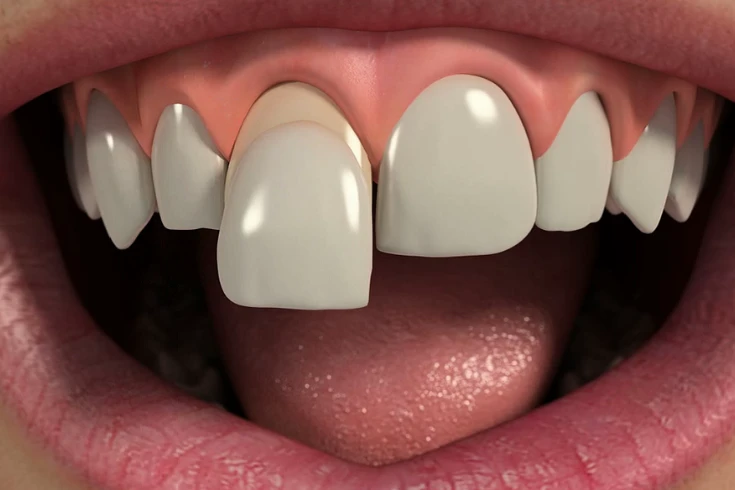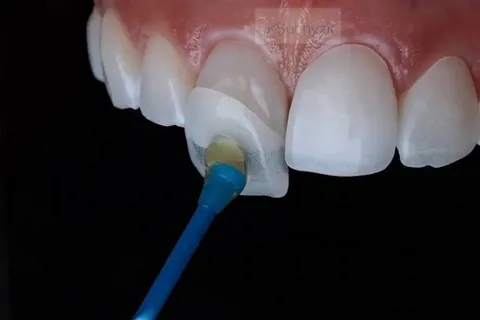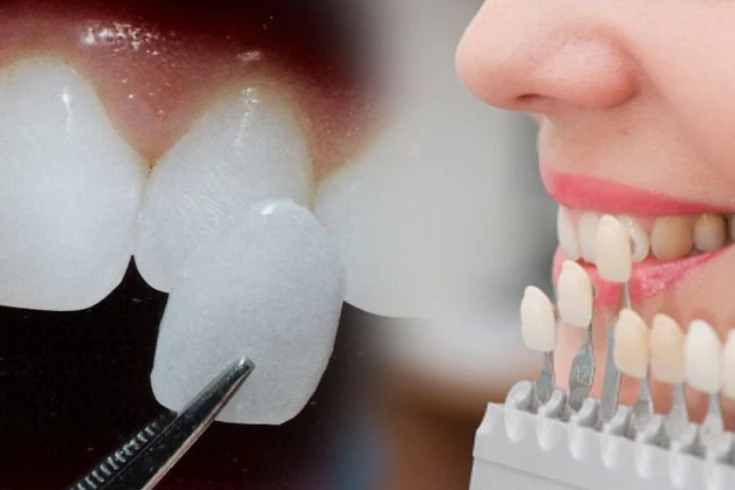Porcelain veneers are one of the most transformative tools in cosmetic dentistry. These custom-made, ultra-thin shells are designed to cover the front surfaces of teeth, improving their appearance and addressing a variety of dental issues. Whether you have discolored, chipped, or misshapen teeth, porcelain veneers can provide a dramatic smile makeover that combines aesthetics and function.
In this in-depth blog, we will discuss the details of porcelain veneers, their benefits, procedure, cost, maintenance, risks, and alternatives, ensuring you have all the information you need to decide if they are right for you.
What Are Porcelain Veneers?
Porcelain veneers are thin, tooth-colored shells crafted from durable porcelain materials. These veneers are custom-made to fit snugly over the front surfaces of your teeth, mimicking the natural color and translucency of enamel.
Types of Issues Porcelain Veneers Address:
- Discoloration: Veneers can conceal stains from tobacco, wine, coffee, or medications that cannot be removed by traditional whitening methods.
- Chipped or Cracked Teeth: They provide structural reinforcement while improving the appearance of damaged teeth.
- Gaps: Veneers close spaces between teeth without orthodontic treatment.
- Misaligned Teeth: They can create the illusion of straighter teeth without braces.
- Worn or Irregularly Shaped Teeth: Veneers restore a balanced and uniform look.
What are the materials Used for Veneers?
Porcelain veneers are primarily made from two types of materials:
- Traditional Porcelain: Known for its durability and resemblance to natural teeth.
- Lithium Disilicate (e.g., Emax): A more advanced ceramic offering superior strength and aesthetics.
Knowing the Advantages of Porcelain Veneers
There are many advantages of Porcelain veneers. Some of the advantages are:
Aesthetic Perfection
Porcelain veneers closely resemble natural teeth, offering a translucent quality that mimics enamel. Dentists can tailor them to your desired shape, size, and color, ensuring a flawless smile.
- Long-Lasting Durability: They are highly durable, lasting anywhere from 10 to 15 years with proper care. They resist stains and wear, making them an excellent investment.
- Quick Transformation: Unlike braces or aligners, which take months or years, porcelain veneers can transform your smile in as little as two dental visits.
- Customization: Each veneer is custom-made to fit your teeth perfectly, ensuring a comfortable and natural appearance.
- Minimal Tooth Preparation: The dentist removes only a thin layer of enamel (about 0.5mm) , preserving most of your natural tooth structure.
- Improved Confidence: A beautiful smile can significantly enhance your self-esteem and how you interact with others.
What is the procedure of The Porcelain Veneer?
The process of getting porcelain veneers typically involves three main stages:
Step 1: Initial Consultation and Treatment Planning
During the first visit:
- Your dentist will assess your oral health, take X-rays, and discuss your smile goals.
- Impressions or 3D scans of your teeth will be taken to plan the design of the veneers.
- You’ll collaborate with your dentist to choose the shape, size, and shade that complements your facial features.
Step 2: Tooth Preparation
To ensure the veneers fit properly and look natural:
- A thin layer of enamel is removed from the front surfaces of the teeth. This allows the veneers to adhere securely without looking bulky.
- Impressions of the prepared teeth are taken and sent to a dental laboratory for fabrication.
- Temporary veneers may be placed to protect your teeth while your permanent ones are being made.
Step 3: Veneer Bonding
Once the custom veneers are ready (usually in 1-2 weeks):
- The dentist will test the veneers’ fit and color, making minor adjustments if necessary.
- Your teeth are cleaned, polished, and slightly etched to create a strong bonding surface.
- A special dental adhesive and curing light are used to attach the veneers permanently.
How do you care for Porcelain Veneers?
Porcelain veneers require the same care as natural teeth. Therefore, to maximize their longevity, follow these tips:
Practice Good Oral Hygiene
- Brush twice daily with non-abrasive toothpaste.
- Floss regularly to prevent plaque buildup around the veneers.
Avoid Staining Substances
Although porcelain is stain-resistant, excessive consumption of coffee, wine, or tobacco can discolor the adhesive around the veneers.
Prevent Damage
- Avoid biting hard objects like ice, pens, or fingernails.
- Wear a mouthguard if you grind your teeth or play contact sports.
Schedule Regular Dental Visits
Visit your dentist for routine checkups and cleanings to maintain the health of your veneers and underlying teeth.
Read: How Long Do Veneers Last?
How Much Does Porcelain Veneers Cost?
The cost of these veneers varies depending on several factors:
- Number of Veneers: A single veneer costs between $1,000 and $2,500 in the United States. Full-mouth treatments can range from $10,000 to $30,000.
- Dentist’s Expertise: Highly experienced cosmetic dentists may charge more.
- Location: Costs can differ based on the local market.
- Materials Used: Advanced ceramics like Emax are more expensive but offer superior results.
Insurance Coverage
Since porcelain veneers are a cosmetic procedure, they are typically not covered by dental insurance. However, partial coverage may apply if veneers are necessary for functional reasons, such as repairing a damaged tooth.
More Detail: How Much Do Veneers Cost?
What are the Risks and Limitations of Porcelain Veneers?
While they are a safe and effective solution, it’s essential to consider their drawbacks. Therefore, some of the risks associated with these veneers are:
- Irreversible Process: The removal of enamel makes the procedure permanent. Therefore, you’ll always need veneers or an alternative solution to protect the prepared teeth.
- Sensitivity: Some patients experience temporary sensitivity to hot or cold foods after the procedure.
- Cost: The dentist charges high fees for placing veneers, and the price is higher if multiple teeth are treated.
- Risk of Damage: While durable, veneers can chip or crack if subjected to excessive force.
What are the Alternatives to Porcelain Veneers?
If veneers aren’t suitable for you, there are other options available. Therefore, some of the alternatives include:
- Composite Veneers: A less expensive alternative made from tooth-colored resin. However, they are less durable and stain more easily.
- Teeth Whitening: Ideal for addressing discoloration without altering the structure of your teeth.
- Orthodontics: Braces or clear aligners like Invisalign can correct misaligned teeth more effectively than veneers.
Conclusion
Porcelain veneers are a versatile and highly effective solution for achieving a flawless smile. They combine aesthetics, durability, and functionality, making them a top choice for anyone looking to address cosmetic dental concerns. If you’re ready to transform your smile, consult a skilled cosmetic dentist to explore how porcelain veneers can work for you. A brighter, more confident you is just a veneer away!
FAQ’s
How much enamel does the dentist remove for veneers?
Only a thin layer of enamel (about 0.5 mm) is removed to ensure the veneers fit seamlessly and look natural.
Are porcelain veneers stain-resistant?
Yes, they are highly resistant to stains. However, the adhesive around the veneers may discolor if exposed to excessive staining substances like coffee, wine, or tobacco.
How much do porcelain veneers cost?
The cost varies depending on the dentist, location, and number of veneers needed. On average, a single porcelain veneer costs between $1,000 and $2,500. A full-mouth set can range from $10,000 to $30,000.
Does insurance cover porcelain veneers?
They are usually considered a cosmetic procedure and are not covered by insurance. However, partial coverage may apply if they are necessary for functional reasons, such as repairing a damaged tooth.
Does getting porcelain veneers hurt?
The procedure is minimally invasive, and local anesthesia is often used during the preparation phase. Some patients may experience mild sensitivity after the procedure, but it usually subsides quickly.
Can porcelain veneers break or chip?
Though they are durable, they can chip or break if exposed to excessive force, such as biting hard objects or trauma to the mouth. Therefore, you should avoid habits like chewing on ice or using your teeth to open packages.




